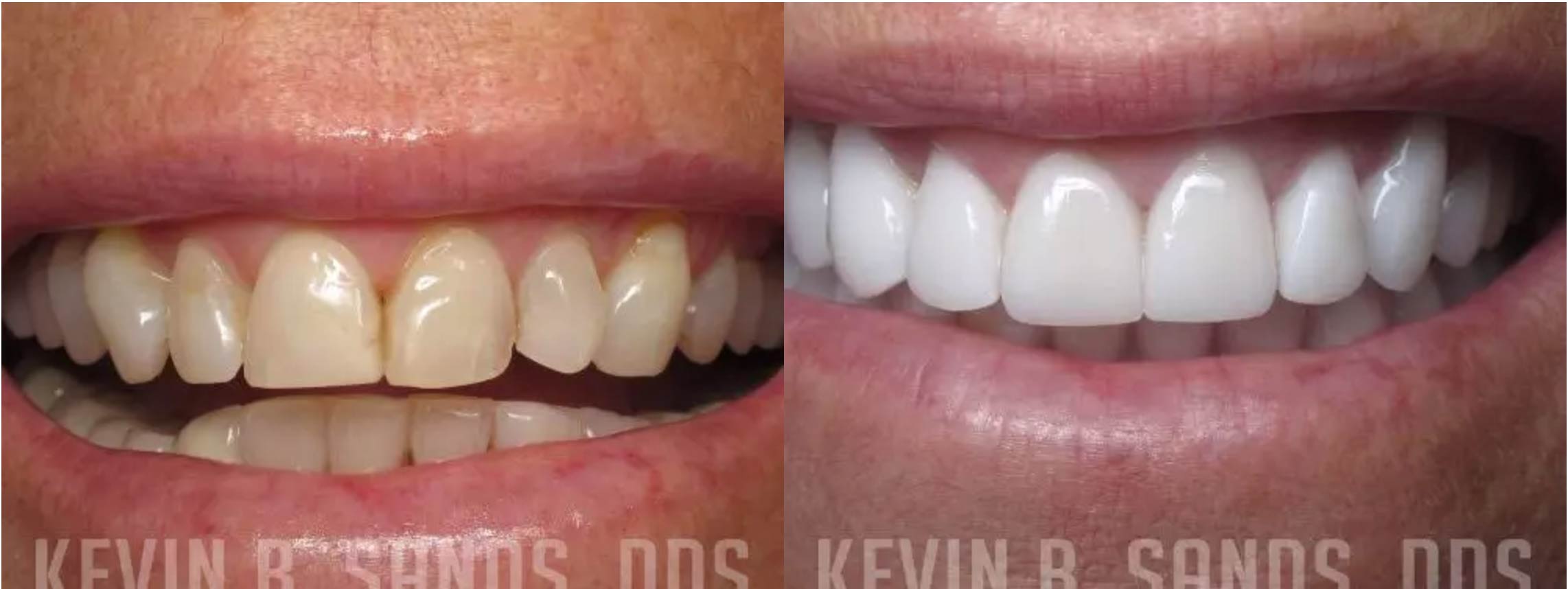
Porcelain veneers can be a game-changer for your smile. Porcelain veneers are made from thin, translucent, and highly durable materials. They look natural and can conceal imperfections in your teeth, such as chips, gaps, or discoloration, but to keep them looking their best and lasting as long as possible, they need to be well-cared for. In this blog, we’ll review how oral hygiene habits, dietary changes, and regular dental check-ups can protect porcelain veneers and keep them looking great for years to come.
What Are the Daily Oral Hygiene Requirements for Veneers?
Just like natural teeth, porcelain veneers need to be brushed, flossed, and rinsed. Although veneers are resistant to staining and decay, a vigilant home oral hygiene routine is essential to keep the natural teeth supporting them and the surrounding gum tissue healthy.
Brush Twice a Day
It’s recommended to brush twice a day with a soft-bristled toothbrush and non-abrasive toothpaste. A soft-bristled toothbrush is gentle on your veneers and surrounding gum tissue, reducing the risk of scratching the veneers or irritating your gums. Hard-bristled brushes can damage veneers and make them look dull over time. Abrasive toothpaste can also scratch veneers, so use an ADA-approved, non-abrasive option. Ask your dentist to recommend a non-abrasive whitening toothpaste, as many contain particles that can wear down veneers.
Don’t Forget to Floss
Flossing is important for gum health and prevents plaque buildup between teeth, which can affect your veneers’ appearance and longevity. Use a waxed floss to glide more smoothly around the veneer edges without damaging them.
Rinse With an Alcohol-Free Mouthwash
Rinsing with an alcohol-free mouthwash keeps bacteria levels low without drying out your mouth, as alcohol can weaken the bonding agents of veneers over time.
Will I Have to Change My Diet When I Get Veneers?
Porcelain veneers are tough but not indestructible. Your diet can affect their appearance and longevity, so be aware of foods that can damage them.
Avoid Staining Foods and Drinks
Porcelain veneers are stain-resistant, but try to avoid excessive exposure to highly pigmented foods and beverages like coffee, red wine, tea, and dark fruits. When consuming these, try drinking through a straw or rinse your mouth well with water afterward to minimize their contact with your veneers.
Limit Acidic Foods
Acidic foods and drinks like citrus fruits, tomatoes, and sodas can weaken the bond between your veneers and natural teeth and potentially loosen the veneers. If you eat acidic foods, rinse with water afterward to neutralize the acid.
Be Careful With Hard, Sticky, and Crunchy Foods
Biting down on nuts, hard candies, and other hard food items can chip or crack veneers, especially soon after receiving them. Cut up crunchy foods into smaller pieces or avoid them if you can.
Don’t Chew on Non-Food Items
While not a dietary change as such, many individuals are inclined to chew on ice, pens, and fingernails or open packages with their teeth. These habits can put undue stress on veneers, increasing the risk of developing cracks and chips in your veneers and damaging the natural teeth underneath.
Are Veneer Maintenance Visits Necessary?
Regular visits to your dentist are vital to keep your teeth healthy and your veneers beautiful. Here is some advice to ensure your porcelain veneers continue to make your smile fabulous:
- Get Professional Cleanings: Get professional cleanings every six months to maintain your veneers and oral health. Dental hygienists can clean areas that are hard to reach with at-home brushing and flossing while removing plaque and tartar buildup that can affect both natural teeth and veneers.
- Get Your Veneers Polished: Ask your dentist about veneer polishing. This special procedure uses non-abrasive materials to remove surface stains from veneers and keep them looking shiny and smooth. Veneer polishing can be done during your regular dental cleanings.
- Talk to Your Dentist: If you experience discomfort related to your veneers or notice any looseness, chipping, or discoloration, contact your dentist ASAP. Early intervention can prevent or minimize damage and may save the veneer(s) if caught early.
10 Top Tips to Prevent Your Veneers From Becoming Damaged
Prevention is the key to extending the life of your veneers, and the following ten tips can help :
- Address Teeth Grinding or Clenching (Bruxism): Grinding or clenching your teeth can weaken veneers. If you grind your teeth, talk to your dentist about getting a custom nightguard to protect your veneers from excessive pressure.
- Follow Your Dentist’s Post-procedure Instructions: After applying the veneers, your dentist will provide essential post-care instructions. Following them can make a big difference in the initial bonding and long-term success of these cosmetic restorations.
- Practice Consistent Oral Hygiene: Not brushing, flossing, or rinsing regularly can lead to plaque buildup and gum disease. Healthy gums are necessary to support veneers, so a proper and consistent oral care routine is a must.
- Use a Whitening Mouthwash: Veneers won’t discolor, but natural teeth can, which can cause a contrast between the veneers and your surrounding teeth. A non-abrasive whitening mouthwash can help keep your natural teeth white so your veneers blend in.
- Wear a Mouthguard for Sports: If you engage in sports or activities that can cause facial impact, wear a mouthguard to protect your veneers from chipping or cracking. Custom mouthguards are available for a comfortable fit and protection.
- Don’t Smoke or Use Oral Tobacco Products: Tobacco products can stain veneers and weaken gum tissue, making veneers look less natural over time. Quitting smoking or other tobacco use will help protect your veneers and your health.
- Don’t Drink Excessively: Alcohol not only increases the risk of gum disease but also weakens the bonding material used to secure your veneers. Limit your alcohol consumption to keep your veneers intact.
- Stay Hydrated and Treat Dry Mouth Symptoms: A dry mouth can lead to excess bacterial growth, which is unhealthy for natural teeth and veneers. Drink plenty of water and chew sugar-free gum to stimulate saliva, which naturally cleans the mouth and keeps veneers plaque-free.
Interested in Porcelain Veneers in Beverly Hills, CA?
By following a vigilant oral hygiene routine, avoiding harmful habits, and visiting your dentist, you can extend the life of your veneers and keep your smile looking great for a long time.

Dr. Kevin Sands is a well-known and respected cosmetic dentist in Beverly Hills who provides top-level, VIP dental care and several of the best porcelain veneer options in the greater Los Angeles area. See his porcelain veneer work here, and call 310.273.0111 to schedule your consultation or fill out our online contact form. We look forward to helping you achieve the smile of your dreams.